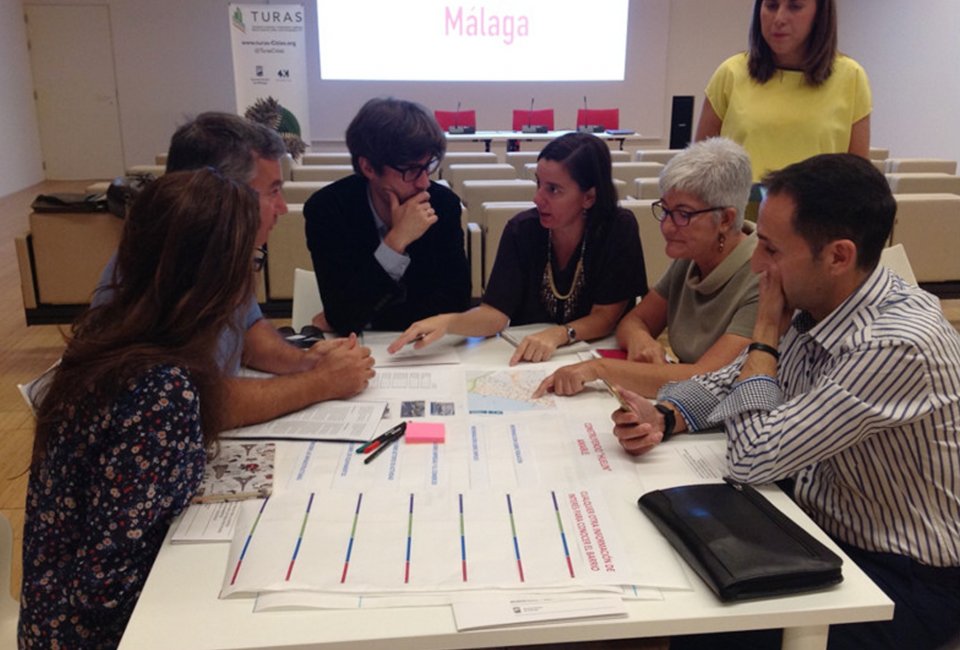
Addressing the steps needed to overhaul the economic development strategy of Málaga.
The Project
The Goal
The aim of the project is to address the different steps of the transition of Málaga´s economic model, through the organisation of several workshops which provided the necessary input to overhaul the economic development strategy of the city.
Local Task Force
Fundación CIEDES and PROMALAGA were the main facilitators of the workshops, while OSMOS and Brussels Environment contributed with the facilitation of one of them. In addition, local community, businesses, the University of Málaga and, the Municipality of Málaga were invited to join in. Political actors had only a sporadically participation in the workshops.
The Process
The four different workshops included local and regional partners and addressed different issues. While some looked at the regional strategy, others addressed challenges in specific neighbourhoods of Málaga, for instance by exploring the potential of Produce Service Systems (PSS) or circular economy.
Existing Dynamics
The workshops built on the existing regional development plan "Málaga Metropoli Abierta", elaborated in 2006. The plan emphasised the role of the Mediterranean sea for the city's development and included a vision that still influences the strategic thinking. Catch-phrases are "Málaga Integrated and Integrating City" and "Málaga Sustainable Use of the City".
On a political level, the workshops were conducted with the assistance of City Hall Economic area, and the urbanism sector of the city, which were included in the ongoing planning with local authorities and public institutions (LAPI).
Obstacles
In the first stage of the workshop, there was some initial shyness that hindered addressing issues frontally. It took some time to build confidence within the groups; therefore, the positive side effect of organising several workshops was that working on a regular basis proved to be quite useful to get to know each other.
Resources
The networks of CIEDES as well as the intimate knowledge of the regional economic was very helpful for the process. CIEDES has already steered the drafting Strategic Development Plan and thus, together with PROMALAGA, they could contribute with human resources for making the workshops a success. Additionally, the platform benefited from venues to host the workshops and the TURAS network, including access to international experts and facilitators. On the other hand, given the complexity of a regional economic development plan, it could have been useful to be able to access a methodology or process that deals with this complexity, by making it manageable without oversimplifying the issues.
Strokes of Luck
The proactive attitude and willingness to participate in the audience, as well as the international networks, were very constructive to make a significant progress.
The Achievements
Short-term Results
The workshops resulted in the elaboration of a Regional Action Plan that organised the next steps towards a new regional development model. So far the measurable change has only come in form of changes in the governance structure of the planning process, not yet in economic, social or environmental outputs. This is due to the late joining of Málaga in the TURAS project and hence, its need to catch up with other city-regions. As a consequence, the experimentation process in Málaga is therefore still very young compared to the other TURAS partner regions.
Long-term Benefits
The workshops led to change the governance setup of how strategic decisions regarding regional economy are taken. One benefit that is already visible is the integration of civil society into the planning processes that address city challenges.
The regional economy of Málaga has been unsustainable in the past as it was dominated by boom and bust cycles in the construction sector and tourism industry. Therefore, a more reflexive and voluntaristic regional development plan will provide for more economic sustainability, whereas a lower dependency on the construction sector will also foster environmental sustainability by slowing down the speed of permeabilisation and housing development.
Key lesson learned - Isabel explains
"In recent years, the city of Málaga has carried out a beneficial study in order to evaluate the strategies which will enable the city to define the action plans and unique projects in the lead up to Málaga 2020. With the pilot we organized within the TURAS Project, we learned that bringing together the knowledge of an international team, a group of local stakeholders and the business community is quite useful to define an action plan."
Isabel Villamor, Promalaga
